With the start of a New Year, Ideal Option, a national leader in outpatient medication-assisted treatment (MAT) for addiction, is bracing for its busiest time of year.
“Addiction doesn’t take a holiday, and for many, the New Year is an opportunity to start fresh. Last year, Ideal Option saw new patient enrollments rise by 21%, from 1,766 in December 2023 to 2,139 in January 2024,” said Sharen Ross, VP of marketing and patient outreach for Ideal Option. “We anticipate even more people starting treatment this January.”
Many treatment centers, counseling programs and support groups see a rise in new participants during January, often linked to several key factors:
- New Year’s Resolutions
January is often seen as a time to turn over a new leaf, make a fresh start and commit to self-improvement. This makes the New Year a natural opportunity for individuals struggling with addiction to stop using substances and start a recovery program. - Holiday Reflection
For some, the stress and emotional turmoil of the holiday season, combined with family gatherings or isolation, can amplify the negative impact of substance use. This heightened awareness can motivate an individual to seek help. - Health and Wellness
January is a time when many individuals focus on their physical and mental health, partly due to societal pressure around fitness and wellness goals. This cultural emphasis on self-care can prompt individuals to prioritize recovery, fitness and overall well-being as part of their New Year’s plans. - Family and Social Influence
Family dynamics and societal expectations often intensify during the holiday season. For those struggling with addiction, the holidays may serve as a reminder of strained relationships, personal losses or disruptions in their life. This can lead to a desire to make a change, with support from loved ones encouraging treatment. - Winter Months
Cold temperatures, limited access to shelters and increased health risks can motivate unhoused individuals to seek resources and treatment for mental health and substance use.
“At Ideal Option, we emphasize that addiction is a chronic disease, not a moral failing. Medication-assisted treatment provides the support necessary for individuals to stabilize their lives,” Ross added. “It’s not trading one addiction for another—it’s giving people the tools they need to heal. Let’s make 2025 the year we shift the narrative and prioritize recovery.”
Ideal Option has helped more than 82,000 patients through a network of over 80 outpatient clinics across 9 states: Alaska, Arkansas, Idaho, Maryland, Montana, New Mexico, North Dakota, Oregon and Washington.
With no waitlists and most forms of insurance accepted, including Medicare and Medicaid, patients can typically get started on treatment for fentanyl, heroin, methamphetamine, alcohol or other substances within 1-3 business days.
Patients can make an appointment by calling (877) 522-1275 or visiting www.idealoption.com.
About Ideal Option
Headquartered in Kennewick, Washington, Ideal Option was founded in 2012 and has since helped more than 82,000 patients through a network of 80+ office-based medication-assisted treatment (MAT) clinics across 9 states. Ideal Option has received The Joint Commission’s Gold Seal of Approval®, demonstrating compliance with its exacting performance standards for safety and quality of patient care. With a mission to serve under-served communities, Ideal Option accepts all forms of insurance including Medicaid and Medicare. Financial assistance and payment plans are also available.
Ideal Option’s team of medical providers carry certifications in Addiction and Emergency Medicine, Internal, and Family Medicine, among other specialties. The company also employs social workers, caseworkers, counselors and mental health practitioners. This holistic approach helps drive positive outcomes, including family stability, stable housing, improved overall health and reduced rates of recidivism.
In all the communities it serves, Ideal Option collaborates with existing stakeholders and providers to improve the continuum of care. This approach includes partnerships with emergency rooms and county jail systems, where individuals with substance use disorder often appear, as well as collaborating with numerous support agencies and municipal programs addressing social needs such as housing, mental health and nutrition support.


